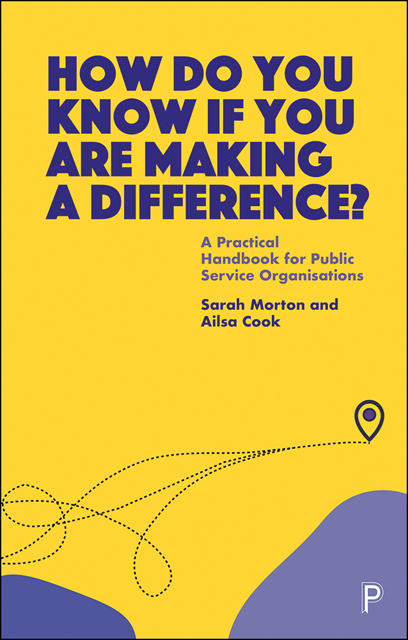 How Do You Know If You Are Making a Difference?
How Do You Know If You Are Making a Difference? Book contents
- Frontmatter
- Dedication
- Contents
- List of figures and tables
- Acknowledgements
- Preface
- 1 Why is it so hard to know if you are making a difference?
- 2 Why complexity thinking can help you understand public services
- 3 What data and evidence do you need to see what difference you are making?
- 4 Embrace the complex contex
- 5 Embrace the complex context
- 6 Clarify the change you want to see
- 7 Get going on your data, evidence and feedback improvement journey
- 8 Tracking progress towards outcomes and impacts
- 9 Telling the story of the difference your work makes
- 10 Using this approach in different contexts and sectors
- 11 Becoming an outcome- and impact-focused organisation
- References
- Index
8 - Tracking progress towards outcomes and impacts
Published online by Cambridge University Press: 20 June 2023
- Frontmatter
- Dedication
- Contents
- List of figures and tables
- Acknowledgements
- Preface
- 1 Why is it so hard to know if you are making a difference?
- 2 Why complexity thinking can help you understand public services
- 3 What data and evidence do you need to see what difference you are making?
- 4 Embrace the complex contex
- 5 Embrace the complex context
- 6 Clarify the change you want to see
- 7 Get going on your data, evidence and feedback improvement journey
- 8 Tracking progress towards outcomes and impacts
- 9 Telling the story of the difference your work makes
- 10 Using this approach in different contexts and sectors
- 11 Becoming an outcome- and impact-focused organisation
- References
- Index
Summary
So far, we have shared some helpful tools for developing a clear understanding of the outcomes and impacts that matter to any initiative, expressed in an outcome map with risks and assumptions. We have considered how this lends itself to understanding data, evidence and the feedback needed to improve learning and delivery. You may even have some ideas about how to gather more helpful data in creative ways. The next step is to start thinking about how to assess whether your work is making a difference.
As already highlighted in Chapter 4, we’re not fans of simplistic approaches to assessing outcomes as met or unmet. Instead, we believe that the journey to improving outcomes or maximising impacts is never over. Effective organisations that own their outcomes are always seeking to improve, reflect and learn, to align resources and develop systems and processes to make the best contribution possible. Taking time to systematically analyse and assess progress is a linchpin of this approach. In this chapter we will outline what is required to analyse, assess and track progress towards outcomes or impacts ahead of reporting, and share some simple and accessible ways of thinking that can help even people with no experience of analysis get going.
This chapter covers:
• getting started with data analysis;
• a practical framework for assessing and tracking the difference you make;
• three levels to help shape analysis.
Analysis need not be a scary or specialist process. It is something that we all do every day. The key to getting going with analysing and assessing progress is to harness these everyday sense- making skills that are so important when working with complex initiatives. We hope that this chapter will give you the confidence to do this.
Getting started with data analysis
We believe in the power of starting with the end in mind and having a clear sense of what success looks like for any process. This is the foundation for being able to break a process down and plan for that success. Many of the organisations we work with lack a clear sense of what good analysis looks like and what they need in order to do it.
Information
- Type
- Chapter
- Information
- How Do You Know If You Are Making a Difference?A Practical Handbook for Public Service Organisations, pp. 121 - 135Publisher: Bristol University PressPrint publication year: 2022